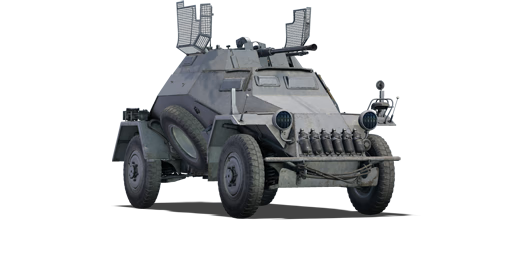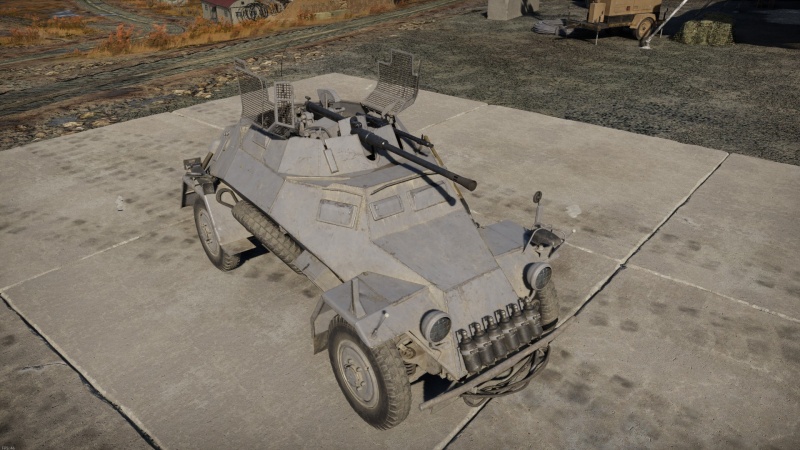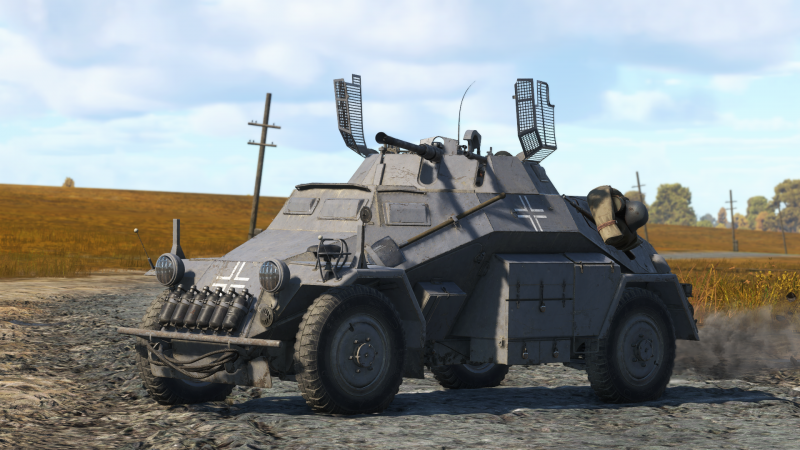Sd.Kfz.222
| This page is about the German SPAA Sd.Kfz.222. For the Chinese version, see Sd.Kfz.222 (China). |
Contents
Description
The Sonderkraftfahrzeug (Sd.Kfz.) 222 was a German light armoured car, designed in 1935 by order of the Ministry of Armaments as an improved version of its predecessor, Sd.Kfz.221. Unlike its predecessor, the Sd.Kfz.222 received a 20 mm automatic gun, in addition to an upgraded hull. Both the Sd.Kfz.221 and Sd.Kfz.222 were actively used in all military campaigns of the Third Reich as reconnaissance and staff vehicles, proving themselves most successfully in the first years of World War II, when combat operations were conducted predominantly on terrain densely criss-crossed by roads. Later, the Sd.Kfz.222 lost its relevance due to its increasingly inadequate armour protection and poor off-road mobility. Nonetheless, the vehicle remained in service with Wehrmacht units until Germany's surrender, being used both for its intended purpose of reconnaissance and for supporting advancing infantry, providing anti-aircraft fire, and conducting police operations. A total of 994 Sd.Kfz.222s were manufactured.
Introduced in Update "Sky Guardians", the Sd.Kfz.222 can fulfil the role of an SPAA, as the armoured car is equipped with a good KwK38 20 mm automatic gun capable of destroying even a bomber with several rounds. However, the long reload time and low shot dispersion prevent the vehicle from effectively combating fast and small aircraft. However, thanks to its excellent mobility on hard ground and the availability of armour-piercing belts for the gun, the Sd.Kfz.222 is also well-suited as a light tank that can quickly reach a key point, outmanoeuvre opponents on the flanks and launch a surprise attack, then swiftly retreat without exposing itself to return fire. However, one should not forget about the vehicle's weak armour protection.
General info
Survivability and armour
Armour protection is, mediocre, to say the least. Almost the entire car is comprised of 8 mm sloped steel plates, which is barely enough to stop normal 7.62 mm AP bullets. HMGs and autocannons will be your biggest pain as they will easily shred your car up from any angle. In fact, if aimed at precisely from certain angles the 8 mm of armour can be pierced by the larger coaxial MGs, such as British BESAs, Swedish 8 mm MGs and even your own 7.92 MG34s (this can be a rare occurrence, but don't discount it). Only the front of the car, with a 30 mm radiator housing and 14.5 mm front plate, can offer protection against rifle-calibre fire, but anything bigger than that will basically fling you back to the garage. The open turret also means that chemical shells (i.e. HE, HEAT and the HESH round from the Lancia 3ro) are an instant death even if they miss; avoid them at all times.
Armour type:
- Rolled homogeneous armour
| Armour | Front (Slope angle) | Sides | Rear |
|---|---|---|---|
| Hull | 30 mm (35°) Lower glacis 14.5 mm (33°) Upper glacis |
8 mm (35°) Top 8 mm (34°) Bottom |
8 mm (39°) |
| Turret | 8 mm (33°) Turret front 8 mm Gun mantlet |
8 mm (35°) | 8 mm (35°) |
Notes:
- Mudguards and stowage boxes are 4 mm thick.
- Wheels (including the spare tire on the right side) are 10 mm thick.
Mobility
The Sd.Kfz.222 moves rapidly on roads, less so on regular ground and will get bogged down in soft terrain. It is easy to control at speed and can engage enemies quickly since it needs little time to come to a full stop.
| Game Mode | Max Speed (km/h) | Weight (tons) | Engine power (horsepower) | Power-to-weight ratio (hp/ton) | |||
|---|---|---|---|---|---|---|---|
| Forward | Reverse | Stock | Upgraded | Stock | Upgraded | ||
| Arcade | 98 | 17 | 5 | 128 | 172 | 25.6 | 34.4 |
| Realistic | 91 | 16 | 80 | 90 | 16 | 18 | |
Modifications and economy
Armaments
Main armament
| 20 mm KwK38 | Turret rotation speed (°/s) | Reloading rate (seconds) | ||||||||||||
|---|---|---|---|---|---|---|---|---|---|---|---|---|---|---|
| Mode | Capacity (Belt) | Fire rate | Vertical | Horizontal | Stabilizer | Stock | Upgraded | Full | Expert | Aced | Stock | Full | Expert | Aced |
| Arcade | 180 (10) | 450 | -7°/+85° | ±180° | - | 35.2 | 48.8 | 59.2 | 65.5 | 69.6 | 7.80 | 6.90 | 6.36 | 6.00 |
| Realistic | 23.8 | 28.0 | 34.0 | 37.6 | 40.0 | |||||||||
Ammunition
- Default: API-T · HEFI-T*
- Sprgr.: HEFI-T*
- PzGr.: API-T
- PzGr.40: HVAP-T
| Penetration statistics | |||||||
|---|---|---|---|---|---|---|---|
| Ammunition | Penetration @ 0° Angle of Attack (mm) | ||||||
| 10 m | 100 m | 500 m | 1,000 m | 1,500 m | 2,000 m | ||
| HEFI-T* | 5 | 4 | 3 | 2 | 2 | 2 | |
| API-T | 37 | 34 | 23 | 14 | 9 | 6 | |
| HVAP-T | 48 | 45 | 31 | 20 | 13 | 8 | |
| Shell details | ||||||||||||
|---|---|---|---|---|---|---|---|---|---|---|---|---|
| Ammunition | Velocity (m/s) |
Projectile mass (kg) |
Fuse delay (m) |
Fuse sensitivity (mm) |
Explosive mass (TNT equivalent) (g) |
Ricochet | ||||||
| 0% | 50% | 100% | ||||||||||
| HEFI-T* | 900 | 0.12 | 0.1 | 0.1 | 10.2 | 79° | 80° | 81° | ||||
| API-T | 800 | 0.15 | - | - | - | 47° | 60° | 65° | ||||
| HVAP-T | 1,050 | 0.1 | - | - | - | 66° | 70° | 72° | ||||
Ammo racks
| Full ammo |
1st rack empty |
2nd rack empty |
3rd rack empty |
4th rack empty |
5th rack empty |
6th rack empty |
Visual discrepancy |
|---|---|---|---|---|---|---|---|
| 18 | __ (+__) | __ (+__) | __ (+__) | __ (+__) | __ (+__) | __ (+__) | __ |
Machine guns
| 7.92 mm MG34 | ||||
|---|---|---|---|---|
| Mount | Capacity (Belt) | Fire rate | Vertical | Horizontal |
| Coaxial | 2,700 (150) | 900 | - | - |
Usage in battles
The Sdkfz.222, (known as Leichter Panzerspähwagen, which means a 'light armored recon. vehicle) is a fast vehicle, which is easily able to reach 50 km/h in no time. The vehicle can sneak behind enemy lines and mark targets for other heavier vehicles to attack. Utilizing its speed, it can set up ambushes at enemy vehicles, when the enemy is not actively observing the area. the 20 mm fast-firing autocannon with AP belts paired with speed can easily disrupt enemy vehicles, slowing them down. This can also be used as a distraction while friendly units are capturing points, at the same time using its mobility to escape enemy rounds. Because of the high elevation angles, it can knock out air targets with either Sprger. or the default ammunition (API-T, HEFI-T) (note that Sprger rounds only contain HEFI-T rounds).
The vehicle can flank enemy units quickly. The main downside of this vehicle is that it has very less armor, which can be penetrated even by the American 50 cal. When loaded with Pzgr. 40, the autocannon is easily more effective than most large caliber cannons, spraying enemy's before giving a chance to react. With its thin armor, a plus is that some APHE rounds will overpenetrate, meaning it will go through the vehicle without activating the fuse. Note this is more common on the side and rear armor.
One downside is that the belt carries only 10 rounds, which quickly are depleted. This has a longer reload rate than most high-caliber weapons, so pre-loading the gun before firing is necessary. When facing heavier enemies (M4 Sherman 105, M4, T-34, SU-122) directly in front of the vehicle, the frontal armor most likely will not take any damage from the 20 mm, even with armor-piercing belts. The vehicle is equipped with smoke grenades which creates a smoke screen in front of the vehicle. When this is done, the enemy cant see you and will probably wait until the smoke clears out. At that time, the vehicle can swiftly go around the enemy and flank them, where the side armor is weak, or a weak spot can be penetrated by the 20 mm AP rounds. This can prove very useful in situations when facing heavy tanks/tank destroyers (note that the armor penetration indicator can be used to see where you can penetrate the enemy vehicle and cause damage is useful when encountering a heavy vehicle). The vehicle is open-topped, meaning it can be strafed frequently by enemy aircraft, and cause critical damage or knocking out crew members. Placing camouflage and bushes on the tank can result in enemy aircraft not spotting you, which is not necessary but will result in better performance. Most vehicles you will face are lightly armored, which can be pened by the default rounds, but using Pzgr.40 rounds will quickly take care of the job without using up a lot of rounds. The tank can quickly capture the points/defend the points against enemy vehicles.
Pros and cons
Pros:
- Fast and nimble
- 20 mm autocannon has a fast rate of fire
- 20 mm HVAP rounds have a high penetration
- The thin armour on the sides and rear mean that most APHE rounds will go right through without activating the fuse
Cons:
- The 20 mm cannon belt consists of only 10 rounds and it gets exhausted very quickly, so reloads are very frequent
- Weak armour from the sides and rear can be penetrated by lighter weapons like autocannons and heavy machine guns (e.g. M13 MGMC, GAZ-AAA (DShK))
- Can be destroyed with overpressure by chemical rounds and artillery strikes
- Poor post-penetration damage of 20 mm shells means that it can be difficult to destroy spacious tanks like the LVT(A)(1)
- Tall wire mesh fencing on the turret sides can give it away if attempting to hide or play stealthily while providing no armour benefits
- Prone to strafing from aircraft
- Has trouble turning in tight and narrow streets
- The 20 mm autocannon is lacking against heavily armoured enemies
- Both the AP and HVAP rounds' penetration drop below 30 mm past 500 m, making it struggle to penetrate common opponents past that distance
History
From 1935 to 1944, Nazi Germany produced a series of light armoured reconnaissance four-wheel drive armoured cars known as the Leichter Panzerspähwagen. Sd.Kfz. 222 (also known as Leichter Panzerspähwagen 2 cm) is the second variant in the Leichter Panzerspähwagen series, equipped with a 2 cm KwK 30 L/55 autocannon and a single MG 13 machine gun.
Development
The Leichter Panzerspähwagen series was created with reliability, fuel flexibility, simple construction, and off-road capabilities in mind. The Sd.Kfz. 222 utilises one of two conventional four-wheeled armoured car chassis - rear-mounted engine. Eisenwerk Weserhütte of Bad Oeynhausen designed the vehicles, while Horch (Auto Union) of Zwickau built the chassis and F. Schichau of Elbing and Maschinenfabrik Niedersachsen of Hanover-Linden assembled them. The engine, which was originally a 3.5 Litre Horch V8, was also upgraded to a 3.8 Litre with 90 PS in 1942. Because of its light weight, the vehicle has a respectable road speed of 80 km/h and a cross-country speed of 40 km/h. Its maximum range was 300 km.
The second variant of the Leichter Panzerspähwagen - Sd.Kfz. 222 has the addition of a gunner increased the crew size to three over the previous variant Sd.Kfz. 221, greatly reducing the commander's stress and responsibility. Several upgrades were made to the Sd.Kfz. 222 between 1937 and late 1943, primarily in terms of firepower; the MG 13 was replaced by an MG 34 in 1938, and the KwK 30 was replaced by the faster-firing KwK 38. (1942). There are at least 990 vehicles produced in all variants.
The vehicle is primarily used by Panzer divisions' reconnaissance battalions (Aufklärungs-Abteilung). While it performed reasonably well in countries with good road networks in Western Europe, it was severely limited by its poor off-road performance on the Eastern Front and in the deserts of the North African campaign.
Replacement
Due to limitations in firepower and mobility during the Soviet Union invasion in 1941, the Leichter Panzerspähwagen Sd.Kfz. 222 was gradually replaced in the reconnaissance role by the Sd.Kfz. 250 half-track. Soviet designers studied captured Sd.Kfz 222s, which led to the development of the BA-64 light armoured car.
Media
- Skins
- Videos
See also
- Related development
- Other vehicles of similar configuration and role
External links
| Eisenwerk Weserhütte | |
|---|---|
| Sd.Kfz.221 | Sd.Kfz.221 (s.Pz.B.41) |
| Sd.Kfz.222 | Sd.Kfz.222 · ␗Sd.Kfz.222 |
| Germany anti-aircraft vehicles | |
|---|---|
| Wheeled | Sd.Kfz.222 |
| Half-track | Sd.Kfz.251/21 · Sd.Kfz. 6/2 |
| Flakpanzer IV | Wirbelwind · Ostwind · Ostwind II · Kugelblitz · Zerstörer 45 |
| Other Flakpanzers | Flakpanzer I · Flakpanzer 38 · Flakpanzer 341 |
| Wiesel AWC | Wiesel 1A4 · Ozelot |
| Radar SPAAG | Gepard · Gepard 1A2 |
| Missile SPAA | FlaRakPz 1 · FlaRakRad |






